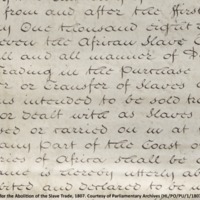
Ireland and the Slave Trade
The Ulster's People's College and the South Belfast Roundtable on Racism launched an exhibition to mark the bicentenary at a Northern Ireland Committee for Refugees and Asylum Seekers (NICRAS) conference on slavery at the Linen Hall Library in 2007. A study group of community workers from NICRAS, the Chinese Welfare Association, Black Youth Network, Donegall Pass Community Forum and the Donegall Pass Community Centre produced the exhibition which told the story of Ireland's involvement in the slave trade and its abolition. Attention was drawn to the fact that merchants in Belfast and across Ireland profited by supplying slave plantations with provisions such as beef or salted fish; some owned slave plantations. The exhibition also stressed that a growing number of campaigners often fought both for Catholic Emancipation and the Abolition of Slavery, linking the two experiences of disadvantage. The exhibition also raised the issues of contemporary slavery and racism. The exhibition toured community centres in Northern Ireland.
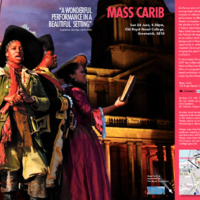
Mass Carib
Mass Carib is a choral performance piece written by Felix Cross. In 2007 it was performed outdoors at the Royal Naval College in Greenwich by Nitro Theatre Company, as a finale to the Greenwich and Docklands International Festival. To accompany the performance, the festival collaborated with the National Maritime Museum and Nitro on a programme of workshops in schools in Greenwich exploring the themes of the production. Mass Carib was written as a Requiem using the liturgical form of the Catholic Mass. It draws on music from West Africa, eighteenth-century Europe and various Caribbean islands. Mass Carib is sung in English, French, Patois, Latin and Yoruba.
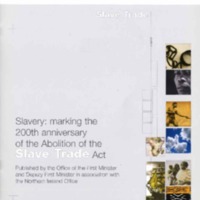
Slavery: marking the 200th anniversary of the Abolition of the Slave Trade Act
The official publication from the Office of the First Minister and Deputy First Minister in association with the Northern Ireland Office, based on the research of historian Nini Rodgers.
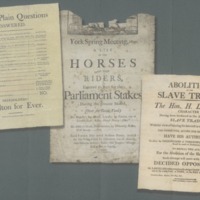
Harewood 1807
2007 saw a number of different projects taking place at Harewood House in West Yorkshire, home of the Lascelles family. The bicentenary was used as an opportunity to explore the family connections with the transatlantic slave trade and the sugar plantations of the West Indies.
As part of a newly developed Learning Programme, leaflets were produced setting out the family connections to Barbados. 2007 also marked the bicentenary of the Yorkshire election in 1807 contested by William Wilberforce, Henry Lascelles (later 2nd Earl of Harewood) and Lord Milton. Competition between the candidates was fierce, based on issues such as Catholic Emancipation, poverty, workers' rights and abolition of the slave trade.
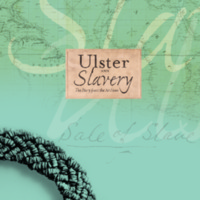
Hidden Connections: Ulster and Slavery 1807-2007
The Hidden Connections exhibition was a result of partnership between the Public Record Office of Northern Ireland (PRONI) and the Linen Hall Library in Belfast. The exhibition explored Ulster's links with slavery after 1807 via people, events and places, and looked at both the pro and anti-slavery debates in Northern Ireland. It drew on documents from PRONI’s archives, artefacts from the Ulster Museum and contemporary books and pamphlets from the Linen Hall Library and elsewhere. After its launch at Linen Hall Library, the exhibition toured Northern Ireland, travelling to Down Museum, the Harbour Museum in Derry, Lisburn City Library and the Ulster American Folk Park.
The wider Hidden Connections programme featured workshops exploring archival sources, performances and lectures by leading scholars. There was a panel discussion on ‘Slavery Now’, a walking tour of Belfast sites associated with the slavery issue, and a boat trip on the Lagan focusing on the port’s links with slave colonies. Gerry McLaughlin’s ‘Blood sugar’ is a drama documentary devoted to the literature of slavery, music and song. 'Freedom and Liberty' was the theme of the UK-wide Archives Awareness Event. PRONI organised special events and produced a catalogue, 'Ulster and Slavery', listing the references to slavery to be found in the archive.